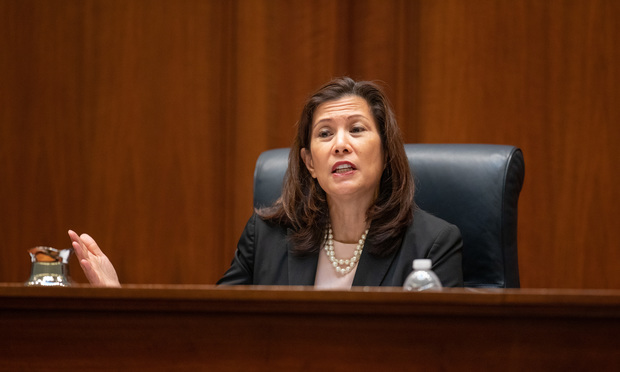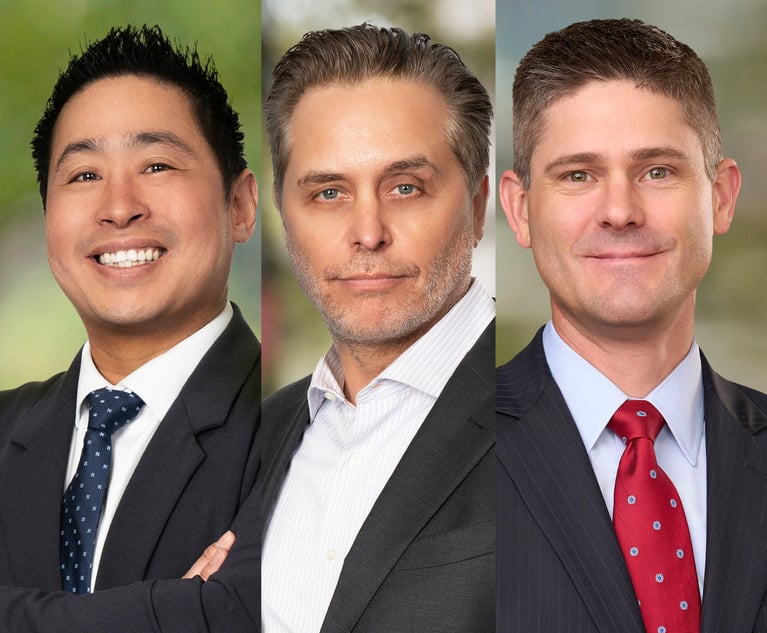More Litigation Ahead for Facebook Over Defendants' Access to Private Posts, California Chief Justice Warns
The California Supreme Court heard arguments raising the same legal question that the U.S. Supreme Court declined to take up Monday: whether social media companies violate criminal defendants' Sixth Amendment and due process rights when they refuse to comply with subpoenas.
May 19, 2020 at 05:02 PM
4 minute read
 Photo: DenPhotos/Shutterstock.com
Photo: DenPhotos/Shutterstock.com
California's chief justice warned Facebook Inc.'s Gibson, Dunn & Crutcher attorneys that they can expect more court appearances over criminal defendants' access to private social media messages in order to build a defense.
During a video hearing Tuesday, California Supreme Court Chief Justice Tani Cantil-Sakauye said that the court had never confronted the constitutionality of subpoenaing social media companies for users' communications and the right to a fair trial, until Facebook v. Superior Court (Touchstone). It's the same legal question that the U.S. Supreme Court declined to take up Monday in a similar case against Facebook that alleged the company violated two criminal defendants' Sixth Amendment and due process rights when it refused to comply with their subpoenas.
In the Touchstone case, which has garnered amicus support from Apple and Google, criminal defendant Lance Touchstone is seeking the social media messages of a shooting victim in attempts to exonerate him from an attempted murder charge. However, Facebook has said that it cannot comply with the subpoena under the Stored Communications Act (SCA).
Gibson Dunn's Joshua Lipshutz, who represents Facebook's counsel in Touchstone and also helped file Facebook's denied petition for certiorari in Hunter v. Facebook, said that the underlying context in Touchstone is squarely governed by the court's decision in Hunter—that the SCA inhibits the disclosure of users' private messages and demands that defendants pursue alternative means to access the material.
Lipshutz offered a couple of alternative methods that don't directly involve Facebook, including subpoenaing the victim of the shooting or the defendant's sister, who allegedly received threatening communications from the victim.
However, public defender Katherine Tesch said the victim deleted the information and that they had heard a rumor that a family member was in contact with the victim at some point, but they don't have reason to believe it was Touchstone's sister. Only Facebook has access to these records, Tesch said.
 Chief Justice of California Tani G. Cantil-Sakauye. (Photo: Jason Doiy/ALM)
Chief Justice of California Tani G. Cantil-Sakauye. (Photo: Jason Doiy/ALM)Justice Joshua Groban asked Lipshutz if Facebook would still refuse to comply with the subpoenas based on the SCA if there weren't any other pathways to obtaining the information.
"I understand your argument to be that the act prevents us from turning this over even if there are no alternatives; we cannot turn this over full stop," Groban said.
"That's correct, your honor," Lipshutz said. But Lipshutz said there will always be other alternatives—there will always be senders or recipients who have access to the information. He also listed a number of situations, such as attorney-client privilege, where a party would deny exculpatory evidence under a statute or code.
"This is not unusual," he said. "I know it sounds unusual, where a party points to federal law and says, 'Look, I'm sorry, we cannot comply with the subpoena.' But there is no constitutional right for a criminal defendant to go directly to a provider in violation of federal law and obtain the information they seek for the criminal defense."
Justice Mariano-Florentino Cuéllar asked Lipshutz if the SCA did not apply and the whole case turned on the question of good cause, how should the trial court proceed?
"We wouldn't be here," Lipshutz said, noting that the Facebook content would be "cumulative and duplicative" after the court unsealed recent declarations supporting the good cause issue. "Facebook's only interest in this case is that federal law prohibits them from turning over the information."
Lipshutz also asked the court not to remand the case on the good-cause issue. Cantil-Sakauye said that whether or not the parties go back to court on the good-cause issue, "this is likely not the last Facebook case we are going to see here in California, particularly at the Supreme Court. You understand that, right?"
This content has been archived. It is available through our partners, LexisNexis® and Bloomberg Law.
To view this content, please continue to their sites.
Not a Lexis Subscriber?
Subscribe Now
Not a Bloomberg Law Subscriber?
Subscribe Now
NOT FOR REPRINT
© 2025 ALM Global, LLC, All Rights Reserved. Request academic re-use from www.copyright.com. All other uses, submit a request to [email protected]. For more information visit Asset & Logo Licensing.
You Might Like
View All
K&L Gates Files String of Suits Against Electronics Manufacturer's Competitors, Brightness Misrepresentations
3 minute read
Meta Workers Aren't of One Mind on Company's Retreat From DEI, Fact-Checking

California Court Denies Apple's Motion to Strike Allegations in Gender Bias Class Action

White & Case KOs Claims Against Voltage LLC in Solar Companies' Trade Dispute
Law Firms Mentioned
Trending Stories
- 1New York-Based Skadden Team Joins White & Case Group in Mexico City for Citigroup Demerger
- 2No Two Wildfires Alike: Lawyers Take Different Legal Strategies in California
- 3Poop-Themed Dog Toy OK as Parody, but Still Tarnished Jack Daniel’s Brand, Court Says
- 4Meet the New President of NY's Association of Trial Court Jurists
- 5Lawyers' Phones Are Ringing: What Should Employers Do If ICE Raids Their Business?
Who Got The Work
J. Brugh Lower of Gibbons has entered an appearance for industrial equipment supplier Devco Corporation in a pending trademark infringement lawsuit. The suit, accusing the defendant of selling knock-off Graco products, was filed Dec. 18 in New Jersey District Court by Rivkin Radler on behalf of Graco Inc. and Graco Minnesota. The case, assigned to U.S. District Judge Zahid N. Quraishi, is 3:24-cv-11294, Graco Inc. et al v. Devco Corporation.
Who Got The Work
Rebecca Maller-Stein and Kent A. Yalowitz of Arnold & Porter Kaye Scholer have entered their appearances for Hanaco Venture Capital and its executives, Lior Prosor and David Frankel, in a pending securities lawsuit. The action, filed on Dec. 24 in New York Southern District Court by Zell, Aron & Co. on behalf of Goldeneye Advisors, accuses the defendants of negligently and fraudulently managing the plaintiff's $1 million investment. The case, assigned to U.S. District Judge Vernon S. Broderick, is 1:24-cv-09918, Goldeneye Advisors, LLC v. Hanaco Venture Capital, Ltd. et al.
Who Got The Work
Attorneys from A&O Shearman has stepped in as defense counsel for Toronto-Dominion Bank and other defendants in a pending securities class action. The suit, filed Dec. 11 in New York Southern District Court by Bleichmar Fonti & Auld, accuses the defendants of concealing the bank's 'pervasive' deficiencies in regards to its compliance with the Bank Secrecy Act and the quality of its anti-money laundering controls. The case, assigned to U.S. District Judge Arun Subramanian, is 1:24-cv-09445, Gonzalez v. The Toronto-Dominion Bank et al.
Who Got The Work
Crown Castle International, a Pennsylvania company providing shared communications infrastructure, has turned to Luke D. Wolf of Gordon Rees Scully Mansukhani to fend off a pending breach-of-contract lawsuit. The court action, filed Nov. 25 in Michigan Eastern District Court by Hooper Hathaway PC on behalf of The Town Residences LLC, accuses Crown Castle of failing to transfer approximately $30,000 in utility payments from T-Mobile in breach of a roof-top lease and assignment agreement. The case, assigned to U.S. District Judge Susan K. Declercq, is 2:24-cv-13131, The Town Residences LLC v. T-Mobile US, Inc. et al.
Who Got The Work
Wilfred P. Coronato and Daniel M. Schwartz of McCarter & English have stepped in as defense counsel to Electrolux Home Products Inc. in a pending product liability lawsuit. The court action, filed Nov. 26 in New York Eastern District Court by Poulos Lopiccolo PC and Nagel Rice LLP on behalf of David Stern, alleges that the defendant's refrigerators’ drawers and shelving repeatedly break and fall apart within months after purchase. The case, assigned to U.S. District Judge Joan M. Azrack, is 2:24-cv-08204, Stern v. Electrolux Home Products, Inc.
Featured Firms
Law Offices of Gary Martin Hays & Associates, P.C.
(470) 294-1674
Law Offices of Mark E. Salomone
(857) 444-6468
Smith & Hassler
(713) 739-1250






